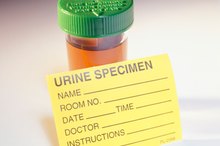List of Foods High in Oxalates
Oxalates can combine with calcium to form kidney stone. Eating foods that contain oxalates increases your body's oxalate levels, and extra amounts of vitamin C may change into oxalate, further boosting your levels. Following a special diet to reduce the amount of oxalate you eat may help reduce the possibility of developing kidney stones. When eating a low oxalate diet, you should have no more than 40 to 50 mg of oxalate daily, according to University of Pittsburgh Medical Center.
Fruits and Berries
Berries and fruits contain oxalate and eating these fruits increases the risk of developing kidney stones. Examples of berries include strawberries, currants blackberries and raspberries. Additional fruits that contain oxalate include tangerines, kiwi and Concord grapes.
Vegetables
Black Pepper and Kidney Stones
Learn More
Many vegetables are on the high oxalate list. Leafy green vegetables such as collards, dandelion greens, mustard greens and beet greens contain oxalate. Additional vegetables to avoid on the low oxalate diet include potatoes, sweet potatoes, green olives, yellow squash, green peppers, okra and beets. Beans, including baked beans, green beans, refried beans, lentils and kidney beans, have high oxalate levels in a single serving. Spinach and rhubarb contain oxalate and may also increase the amount of oxalate in your urine, according to the National Kidney and Urologic Diseases Information Clearinghouse.
- Many vegetables are on the high oxalate list.
- Additional vegetables to avoid on the low oxalate diet include potatoes, sweet potatoes, green olives, yellow squash, green peppers, okra and beets.
Soy, Nuts and Seeds
Soy products such as cheeses, milk and yogurts, as well as tofu and soy nuts, contain high levels of oxalate. You should also limit the consumption of nuts, peanuts, pistachio nuts, almonds, sesame seeds and nut butters when on a low oxalate diet.
Grains
Foods to Avoid Because of Vulvodynia
Learn More
Grains that may cause kidney stones because of their oxalate levels include grits, pretzels, whole wheat bread, cereal, fruitcake, bran and wheat or rye crispbreads.
Beverages
Some beverages you need to avoid when trying to lower oxalate intake include coffee, tea and juices. Because fruits and berries contain oxalate, you should avoid juices from the same foods. The juices to limit include grapefruit, grape and cranberry. You should also not drink more than eight ounces of instant coffee each day, according to the National Kidney Foundation. Beverages containing cocoa, such as hot chocolate and chocolate milk, are high in oxalate.
- Some beverages you need to avoid when trying to lower oxalate intake include coffee, tea and juices.
Related Articles
References
- National Kidney Foundation: Diet and Kidney Stones
- University of Pittsburgh Medical Center: Low Oxalate Diet
- Harvard Health Publishing. Juicing -- Fad or Fab?. July 2015.
- National Center for Complementary and Integrative Health. “Detoxes” and “Cleanses”: What You Need To Know. Updated September 2019.
- Lien YHH. Juicing Is Not All Juicy. Am J Med. 2013;126(9):755-756. doi:10.1016/j.amjmed.2013.04.007
- Getting JE, Gregoire JR, Phul A, Kasten MJ. Oxalate Nephropathy Due to ‘Juicing’: Case Report and Review. Am J Med. 2013;126(9):768-772. doi:10.1016/j.amjmed.2013.03.019
- Uddin MK, Juraimi AS, Hossain MS, Nahar MA, Ali ME, Rahman MM. Purslane weed (Portulaca oleracea): a prospective plant source of nutrition, omega-3 fatty acid, and antioxidant attributes. ScientificWorldJournal. 2014;2014:951019. doi:10.1155/2014/951019
- Schroder T, Vanhanen L, Savage GP. Oxalate content in commercially produced cocoa and dark chocolate. J Food Compost Anal. 2011;24(7):916-922. doi:10.1016/j.jfca.2011.03.008
- University of Michigan Medicine. Healthwise. Foods High in Oxalate. Updated August 11, 2019.
- Encyclopedia of Food and Health. Cambridge, MA: Academic Press; 2015. doi:10.1016/B978-0-12-384947-2.00036-2
- Knight J, Madduma-liyanage K, Mobley JA, Assimos DG, Holmes RP. Ascorbic acid intake and oxalate synthesis. Urolithiasis. 2016;44(4):289-97. doi:10.1007/s00240-016-0868-7
- Lamarche J, Nair R, Peguero A, Courville C. Vitamin C-Induced Oxalate Nephropathy. Int J Nephrol. 2011. doi:10.4061/2011/146927
- Barman AK, Goel R, Sharma M, Mahanta PJ. Acute kidney injury associated with ingestion of star fruit: Acute oxalate nephropathy. Indian J Nephrol. 2016;26(6):446-448. doi:10.4103/0971-4065.175978
- Glew RH, Sun Y, Horowitz BL, et al. Nephropathy in dietary hyperoxaluria: A potentially preventable acute or chronic kidney disease. World J Nephrol. 2014;3(4):122-42. doi:10.5527/wjn.v3.i4.122
- Bhasin B, Ürekli HM, Atta MG. Primary and secondary hyperoxaluria: Understanding the enigma. World J Nephrol. 2015;4(2):235-44. doi:10.5527/wjn.v4.i2.235
- Latulippe ME, Skoog SM. Fructose malabsorption and intolerance: effects of fructose with and without simultaneous glucose ingestion. Crit Rev Food Sci Nutr. 2011;51(7):583-592. doi:10.1080/10408398.2011.566646
- Henning SM, Yang J, Shao P, et al. Health benefit of vegetable/fruit juice-based diet: Role of microbiome. Sci Rep. 2017;7(1):2167. doi:10.1038/s41598-017-02200-6
Writer Bio
Abigail Adams began her freelance writing career in 2009, teaching others about medical conditions and promoting wellness by writing on online health and fitness publications. She is educated and licensed as a registered nurse, having received her degree from North Georgia College and State University.









